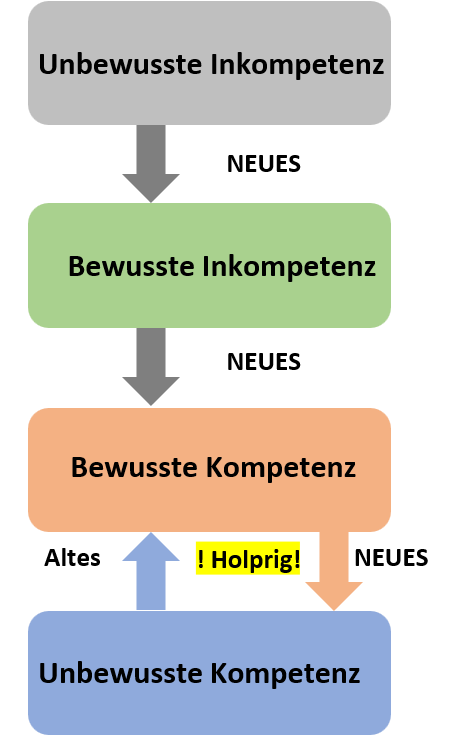The 4 Levels Of Competency
The four levels of competence are a learning phase model from developmental psychology, which clearly shows the path from incompetence to competence.

A tribal people living outside of any civilization live in the forests near a beach, the Indian Ocean. One day, while fishing, some members of the tribal people discover a strange object washed up by the waves.

They pull out the strange item and take it to their chief. The chief had never seen such an object. He touches him. He even smells him. But he finds himself confronted with something completely new to him.
Ambition in the chief is awakened. He desperately wants to find out what this unknown object is all about. He is deeply involved in this matter. He sees these two round, black parts that have a yellow frame. Also mounted on the frame is something padding with a strange shape. The frame is constructed in such a way that the front round part can be moved left and right.
He places the object upright on the two round parts and notices that when you push the object, the two round parts rotate and the object moves. Not far. Shortly thereafter, it falls to the side on the ground. The chief goes to bed thoughtfully in the evening. He is disappointed that he still hasn't figured out what this unknown object is and what to do with it.
The next day, when the chief deals with the unknown object again, he sits on the padded object with the strange shape that is on the frame. He gives momentum with his feet and rolls a few meters. And he's happy. After a few more tries, the chief notices that these two parts, which stick out to the side from the object, are just right for putting his feet on. He holds on to the front part of the frame, gives a strong push and then puts his feet on these two parts that stick out to the side. He finds that he can use his arms to determine direction. Shortly thereafter, he falls over with the object. He tries again. And falls down again. On the next try he moves his legs and notices that these two parts are also movable under his feet. It also makes the unknown object he's sitting on appear to move faster. As soon as the object slows down, the chief falls to the ground again.
From then on, the chief practiced using this hitherto unknown object as a means of transport almost without interruption. The chief takes every journey with his new vehicle. He still has to concentrate a lot on every ride and sometimes he falls, but overall it works very well.
After some time of practice, the chief no longer has to think about how driving with this item works. The chief automatically makes the right movements at the right time.
The story of the chief and the bicycle shows the four levels of competence very clearly.

Unconscious Incompetence
This is the first level of competency. At this stage, a person is unaware that they don't know or can't do something. New input takes the person to the second stage.
Until the chief saw the bicycle for the first time, he did not know that he could not ride a bicycle, let alone that such a means of transport existed. By becoming aware of his ignorance, he attained the second level of competency.
Concious Incompetence
This is the second level of competency. At this stage, a person knows they don't know or can't do something. New input and repetition lead to the third level of competence.
The chief didn't know how to ride a bike. By working intensively with the bicycle, he found out how to use it. He now knew how to use the bicycle and thus reached the third level of competence.
Conscious Competence
This is the third level of competency. At this stage, a person knows that they know or can do something. In this phase, exercises are carried out. The aim is to get to the last level of competence.
From then on, the chief rode his bicycle everywhere. He practiced more and more until it worked without even having to think about how to do it. So he got into the fourth level of competency.
Unconscious Competence
This is the fourth and final level of competency. In this phase, knowledge is automatically applied correctly in the situation or an activity is automatically carried out correctly.
The Unconscious Competence In The Seminar Context
Since exercises are carried out in the third level of competence, experienced participants in the seminar context often have to be "brought back" from the last to the third level of competence. This can lead to resistance , as they have already automated the knowledge and therefore may not see the benefit of doing things differently all of a sudden. In this situation, the participants should be picked up individually and acknowledged. In addition, the individual benefits should be explained to the participants.
You can already do it in way A and have fully automated the whole thing, as your successes A and B also show. But if I were to show you another variant with which you could have additional benefits A and B, that would be it ok for you!?